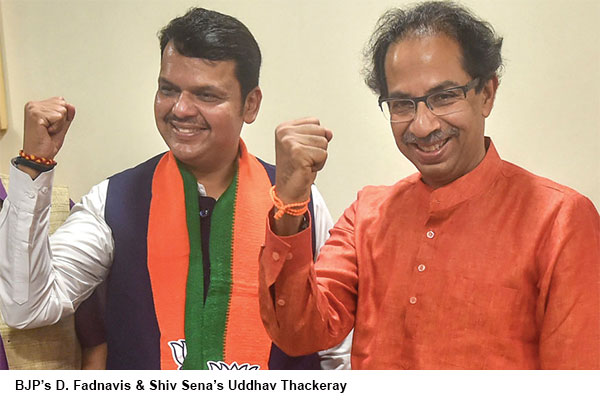 With the Bharatiya Janata Party (BJP) and its alliance partner, the Shiv Sena (SS) having won 161 seats in the state’s 288-member legislative assembly in the recently concluded election and likely to form the government, the new BJP-SS government of Maharashtra would do well to thoroughly revamp its education policy initiatives. Since the BJP-Sena alliance was voted to power in October 2014, the state’s education record has been marked by protests, litigations and policy rollbacks.
With the Bharatiya Janata Party (BJP) and its alliance partner, the Shiv Sena (SS) having won 161 seats in the state’s 288-member legislative assembly in the recently concluded election and likely to form the government, the new BJP-SS government of Maharashtra would do well to thoroughly revamp its education policy initiatives. Since the BJP-Sena alliance was voted to power in October 2014, the state’s education record has been marked by protests, litigations and policy rollbacks.
For instance last August, the education ministry rescinded its July 2017 order and re-introduced internal exams in social science and language subjects for class X students of state board-affiliated schools from the academic year 2018-19. The 2017 order prompted a sharp drop in the pass percentage of the 1.7 million students who wrote the 2019 secondary school certificate (SSC) examinations and caused chaos during the junior college admissions this June. That order and its fallout also forced the resignation of higher and technical education minister Vinod Tawde who was subsequently denied a party ticket in the recently concluded assembly election.
Another failed initiative of the BJP-led coalition government which had to be discontinued because of implementation difficulties was the 2015 ‘competency test’ showcased as proof of its determination to improve the quality of primary education. Introduced to assess the basic competencies of class I-VIII students, these tests were discontinued last year after the haphazard manner in which the tests were conducted and widely reported question paper leakages.
Similarly, Mumbai University’s 2017 decision to introduce online assessment of answer papers, which caused an unprecedented delay of over two months in the announcement of results, had to be rolled back after considerable damage was caused to the 163-year-old varsity’s reputation. Certainly, the state government’s education ministry has had more than its share of troubles during the past quinquennium.
In 2018, violent protests by the state’s powerful Maratha community demanding a special quota in education institutions rocked the state. In November 2018, the state government conceded a 16 percent quota which was reduced to 12 percent by the Bombay high court. However, with the reserved quotas for various castes, communities and tribes, aggregating 74 percent — well over the 50 percent ceiling imposed by the Supreme Court — there’s widespread resentment among non-quota (merit) students who have been denied admission into the state’s top-ranked government colleges. Several quota-related cases are pending in the Bombay high and Supreme Court.
Also read: Priorities of BJP/NDA Government 2.0
Maharashtra has 25 million school-going children with 16 million enrolled in elementary (classes I-VIII) and 6.6 million in secondary (IX-XII) schools. Educationists are hoping the BJP-Shiv Sena government, which failed to make any significant impact in its first term, will fare better this time round. “There was a lack of maturity in the way the BJP-SS coalition managed education during the past five years. The problem wasn’t lack of resources, but accountability. In India’s most industrialised state, there is urgent need for quality improvement across the education spectrum. Thus far, government policies have expanded the educracy rather than the number of educators. The government also needs to acknowledge that private schools are leaders in pedagogy and administrative innovation which are urgently required. One hopes the BJP-Shiv Sena 2.0 government realises that quality education requires institutional autonomy,” says Milind Mhaske, director of the Mumbai-based Praja Foundation which closely monitors Maharashtra’s education sector.
Dipta Joshi (Mumbai)



























